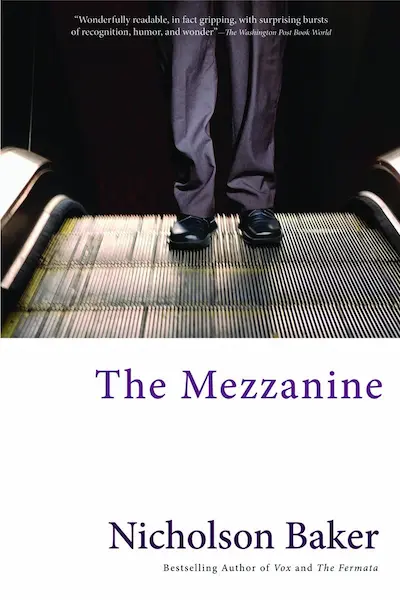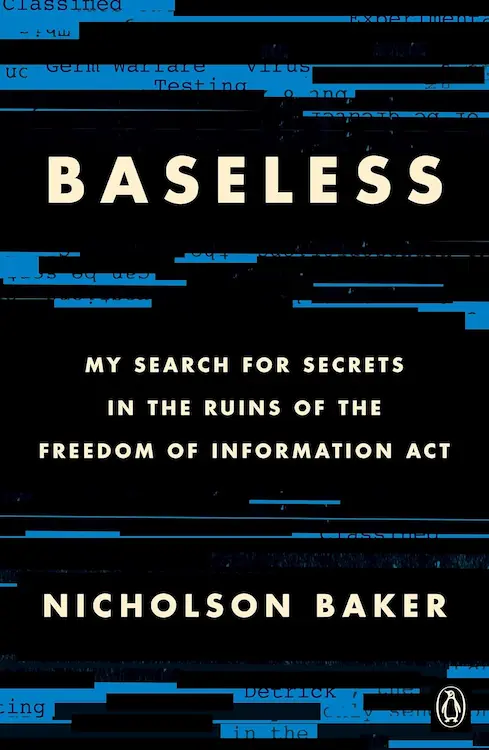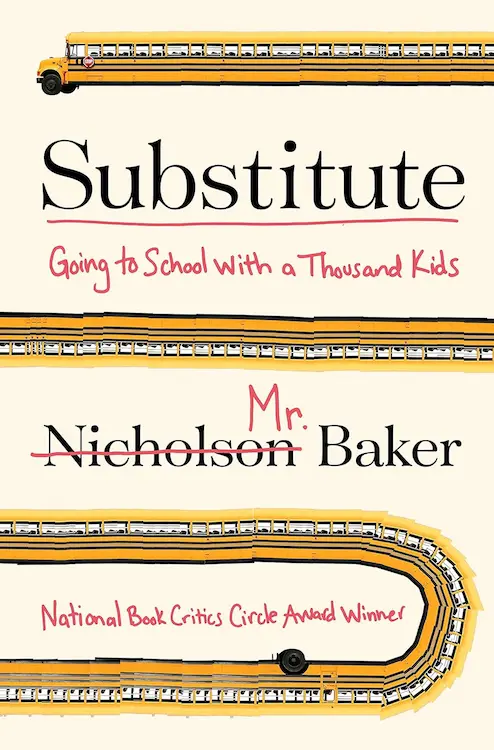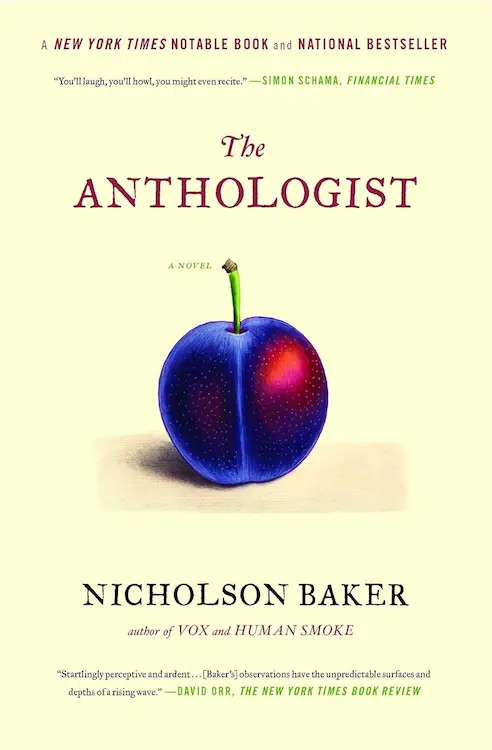In The Mezzanine, by Nicholson Baker, the seemingly mundane events on a young man’s lunch hour are magnified in his mind into complex statements on the modern condition.
Enjoy Rylie Fong’s review of The Mezzanine by Nicholson Baker.
In this LitStack Review of The Mezzanine
The Wonders Within The 9 to 5
The Mezzanine by Nicholson Baker, is a book that you may not have thought you needed at first, but it quickly exemplifies the very concept of reading to feel understood and illustrates its importance. In this short read, Baker manages to elevate an ordinary work day into a hilarious glimpse into the rhythm of life itself. For anyone currently or previously employed by a corporate office, this novel will feel eerily real (and therefore exceptionally comedic) as it accurately describes the intricacies of our everyday thoughts and interactions. It is because of Baker’s deep understanding of the corporate world and the way that he awakens the humor and beauty in it that this book winds up being anything but the same old corporate drudgery. There is a whole world contained within the corporate employee’s work life, and The Mezzanine seeks to both capture this reality and open our eyes to the wonders that lie within the 9-5.
Our Nameless Narrator, Our Nameless Social Contract
I had signed enough office farewell and birthday and get-well cards by that time to have developed an unhealthy sensitivity to the nuances of signature placement. (Baker 31)
The narrator in The Mezzanine is like our inner voice, embodying our own mental narrators as he endures just another day of awkward office interactions, broken shoelaces, and public bathroom etiquette. Baker cleverly leaves this narrator nameless and in first-person, allowing the reader to slip into this 8-hour workday as if it was their own and seamlessly blend the lines of storytelling and lived experience. The events in his story are mundane, highlighting the importance we give to the commonplace events and interactions of our day. How do we acknowledge each other as we run into each other in the bathroom? How much does it impact our day and our routine to suddenly break a shoelace at work? How do we perform as the perfect co-worker, maintaining the delicate balance of friendliness and distance in each conversation?
The “unhealthy sensitivity to the nuances of signature placement” that the narrator perceives in signing his co-worker’s get-well card is representative of the meaning given in the social settings of an office—an understanding of the implicit social order and hierarchy at play. He cannot possibly sign the card in the same area as his boss (which obviously must symbolize he believes himself an equal to his professional superior), but he also has to signal just the right degree of familiarity in his relationship with this co-worker (in consideration of how much they have spoken recently, of course). This socialized dance of propriety is just one of many that most office workers can understand, and yet few put words to. In experiencing the narrator’s social awkwardness and mental calculations, we understand just how much of our time and energy is put into every decision or interaction with the external world that at first seems trivial.



Footnotes, Thought Spirals, and Perspective
People seem to raise their eyebrows whenever they bring something close to their faces. The first sip of a morning cup of coffee makes you raise your eyebrows; I have seen some individuals displace their entire scalp along with their eyebrows when they bring a forkful of food to their mouths. A possible explanation is that eyebrow-raising is a way of telling your brain not to activate the natural flinch reaction that the approach of moving objects near the face normally triggers. (97, footnote 1)
The author, Nicholson Baker, is also one of the most creative and dedicated users of the footnote. While footnotes are often used in academic journals more than literary works, the narrator uses footnotes to go on extensively researched or simply insanely detailed tangents regarding everything from the history of straws to the facial patterns of people eating (think: your obsessional Reddit deep dives and random pattern recognition when people-watching). This adds another layer of comedic realism to The Mezzanine in Baker’s portraits of the everyday, representing more of our internal world as it comes into contact with the external world.
Juxtaposing the academic formatting of footnotes with the almost nonsensical minutiae that is contained within The Mezzanine, readers are further drawn into the hilarity that is existing in this world where such thoughts come to be. This juxtaposition works to point out the irony in how seriously we take things, and asks us to question what is considered important, and why. In a further expansion on the idea of how much time and energy we spend on subtle particulars, Baker shows us how these moments and these thoughts make up our life, and how silly this can be at times. What he is providing is perspective—perspective that these things matter so little and yet so much at the same time. Some things that we momentarily spiral on can be less all-important than they seem, and some moments of joy or silliness can be more important than registers at a given time. With this perspective, perhaps we can find it in us to laugh a little more, worry a little less, and find balance in how we weigh the world in our eyes.



It’s A Wonderful Life
So now I want to do two things: to set the escalator to the mezzanine against a clean mental background as something fine and worth my adult time to think about, and to state that, while I did draw some large percentage of joy from the continuities that the adult escalator ride established with childhood escalators, I will not try to glide on the reminiscential tone, as if only children had the capacity for wonderment at this great contrivance. (40)
Using humor as a starting point, The Mezzanine builds upon itself to create a story that asks us to think about how we receive life and how to find balance. In between the consuming spirals of the footnotes and the relatable office experiences, there are also clear glimmers of wonder and joy. Rather than just focusing on the laborious daily grind or even just making fun of it, Baker makes The Mezzanine more complex by highlighting the little wins. The narrator describes the rays of sunlight being soaked up in a lunch break spent reading outside, the enjoyment of riding an escalator instead of walking a steep flight of stairs, the nostalgic taste of a chocolate chip cookie with milk. Through descriptions of these momentary sparks of joy, Baker illuminates the importance of recognizing the little things and acknowledging experiences of satisfaction, no matter their degree of perceived simplicity.
Adulthood and working in a corporate office can often feel dull, but Baker writes to bring our miniature theater to the main stage. Instead of seeing ourselves as going through the motions, The Mezzanine is an invitation to see these motions as life itself, and to remind ourselves that happiness is not just reserved for our childhood or our nostalgic memories of it, but our present inner-child and the person we are now. Becoming an adult, though hosting a whole new world of responsibilities and social pressures, also bequeaths a greater amount of consciousness and receptivity to everything that life has to offer. Being conscious enough to appreciate the little things allows us to find meaning in our lives and encourages us to give weight to even the smallest things that make us feel good, thus being able to see life for all it is worth.
Enjoy the Peace and Happiness
Nicholson Baker’s The Mezzanine is an invitation to give yourself a very necessary break from your daily routine, to laugh and enjoy the nuggets of peace and happiness that can be found within. On days when you feel your life lacks meaning or direction, The Mezzanine is here to remind you that what seems like no plot is a plot in itself. If you like The Mezzanine, I also encourage you to watch one of my personal favorite films, Perfect Days, or enjoy this book’s perhaps more cynical counterpart about housewives, Mild Vertigo by Mieko Kanai. Through these works, we are reminded that significance can be found even in the most superficially tedious stories, and that our lives, however ordinary they may be, deserve as much respect in how extraordinary they really are.
~ Rylie Fong
Comment Using Emote
About Nicholson Baker, Author Of The Mezzanine
Nicholson Baker is an American writer born in New York and currently based in Maine. His fiction is known for focusing on world-building and his characters’ inner consciousness, and has also written several notable non-fiction books. He has previously been awarded the 1997 James Madison Freedom of Information Award, the 2001 National Book Critics Circle Award for Double Fold, a book on the American library system, the 2014 Calw Hermann Hesse Prize for the German translation of Double Fold (with his German translator Eike Schönfeld), and was awarded a Guggenheim Fellowship in 2018.
Other LitStack Resources
Be sure and look at our other LitStack Reviews for our recommendations on books you should read, including reviews by Lauren Alwan, Allie Coker, Rylie Fong, and Sharon Browning.







